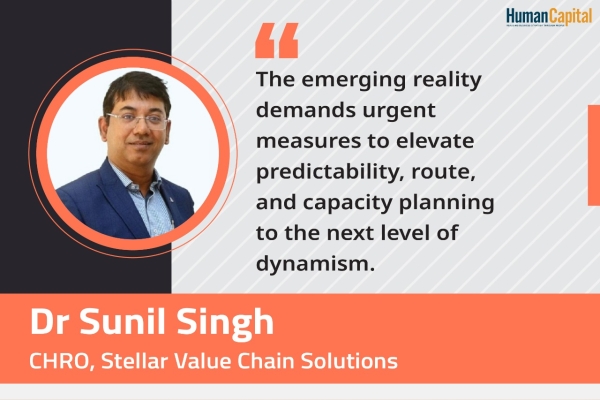“No Man ever steps in the same river twice for it’s not the same river and he is not the same man.” - Heraclitus
While change has always been constant, it is the pace of change that has changed in the recent times. Speed has been critical for all businesses, and thus, strategy, processes, technology, and most importantly, culture has to be agile and quick to change. Being ill‑prepared for change can result in wastage of resources and a huge loss of opportunity. As an HR professional, I believe that change in most organisations fail owing to employees being unable to cope with it. Culture plays a very dominant role in executing any change. Human Resource thus plays an important role in managing and sustaining such transformation. And, I recommend a tool called MSMR that can be used by HR teams to make any transformation a success.
Motivation
Change is uncomfortable; to say the least, and, employees need a compelling reason to want to make it work. Change can never make it to the finishing line just because the ‘Management’ has asked for it. There has to be an undeniable objective behind it. The purpose should not only be powerful, but, it should also be impressed upon with powerful communication. It is supposed to reach the last mile. Social proof plays a big role in motivating employees that live out the new behaviours. So a reward mechanism should be put in place that provides incentives to employees to adapt well to the change.
In Quotes “Just like our parents built values and habits through the power of constant repetition, any change requires a similar repetition. All initiatives, all communication and efforts to train and upskill have to be constantly repeated and refreshed.”
Skill upgradation
We all know that it requires more than intent to change habits. E.g. today, the HR function needs to adapt to changing technologies and use analytics for decision making. While the objective is clear, it requires upgradation of skills to really capitalise on this change. Thus, training becomes an essential part of change. Training on processes, technology, and on simple practical behaviours is important to bring any transformation to light. I usually recommend customised training programmes which are specifically created keeping the organisation in mind, rather than using off-the-shelf programmes that serve as a tick mark.
Measurements
What you measure is what you improve. So, putting success metrics in place is necessary to track performance. Transformation efforts need to show a positive impact on several data points on a consistent basis. Any stagnant or declining trend needs to be investigated, as these can provide useful early warning signals. The monitoring progress of this should mostly be done with a bit of organisation muscle to ensure seriousness in improving at every stage.
Repetition
Just like our parents built values and habits through the power of constant repetition, any change requires a similar repetition. All initiatives, all communication and efforts to train and upskill have to be constantly repeated and refreshed. This needs to be done a lot more in the initial phase of transformation. Once it is a part of the culture, one will be able to see that the culture communicates the message in its own powerful way.
In Quotes “Any transformation is tough and requires a humongous effort by the management and the Human Resource function. Resistance from employees, whether due to poor will or poor skill needs to be handled with constant reinforcement.”
Our transformation journey at the DCB Bank fills us with extreme pride. It started seven years ago, when we embarked in building a Culture of Service in the Bank wherein we outlined and adhered to the aspects mentioned below.
Creating a simple Service Philosophy
We established three simple pillars of our service philosophy and termed it the Power of Three - Empathy, Speed and Quality (ESQ). The thought process behind this was that the tenets of our service philosophy should be simple for employees to understand and critically differentiate our customers. The important thing here is that the initial discussions and brainstorming sessions were done with the MD and CEO and his core team.
Launch of the Programme
The launch was planned with the MD who himself had conducted road shows across the length and breadth of the country. These Road Shows were engaging, full of specific stories and inspiration. They simply highlighted the ‘Why’ we need to do this. There was a heart-warming feedback from our employees who probably have never attended such sessions conducted by the MD in their previous organisations.
Training
The Training programme was built around the ‘How’ of change. Empathy, Speed and Quality (ESQ) were broken down into simple achievable behaviours. The unique part of the programme, which was titled as ESQ was not just conducted by internal Trainers, but was actually run by ESQ Champions, who were hand-picked by the core team. These ESQ Champions mostly consisted of those from the senior management team across different departments. Their responsibility was not just to conduct this one Day Workshop, but also to be catalysts. They had to take up specific issues faced by employees to actually live out ESQ and resolve them. The fact that the programme was actually run by several department and business Heads made it obvious that the Bank is very serious about this change. Employees made pledges at the end of it and outlined specific actions that they will undertake to change.
Rewards
The HR Team put a mechanism in action to collect and reward inspiring ESQ stories. Employees were given spot awards and vouchers for living out ESQ. A newsletter called ESQuire was created, which was published on a monthly basis with ESQ Stories, ESQ Tips and articles.
Communication
Communication around ESQ was made repetitive. Constant postmasters reiterating the philosophy along with employee pledges were published. And, soon, we witnessed that employees themselves started using ESQ as a buzz word in their interactions and even in their complaints.
ESQ Scores
We introduced a very unique survey where employees from one department scored another department on their ESQ quotient. This survey was online and is well in practice since the last six years. The Team with the highest scores gets rewarded. Interventions are planned by the HR Business Partners for all the low scoring teams. This has ensured that we treat all our internal employees with ESQ as well. While the last seven years of this journey have been extremely rewarding as we have seen the transformation take shape and build a culture that is almost self-sustaining now, it is important to keep the communication alive.
Any transformation is tough and requires a humongous effort by the management and the Human Resource function. Resistance from employees whether due to a poor will or poor skill needs to be handled with constant reinforcement. I believe that all employees want a better tomorrow and you can take them along in the journey if done well. And if you have employees who do not want to be part of this journey, just ensure that you have many more employees who rally around the purpose. The distractors then may not have much muscle or voice. Transformation is relative to a point in time and keeps changing. The only way we can remain relevant is through constant change. As Heraclitus once said “No Man ever steps in the same river twice for it’s not the same river and he is not the same man.”
Is your organisation post-COVID-ready?
Trending
-
SBI General Insurance Launches Digital Health Campaign
-
CredR Rolls Out 'Life Happens' Leave For Its Employees
-
Meesho Announces 30-Week Gender-Neutral Parental Leave Policy
-
Microsoft Unveils Tech Resilience Curriculum To Foster An Inclusive Future
-
60% Indian Professionals Looking For Job Change Due To COVID: Survey
-
SpringPeople And Siemens Collaborate For Digital Transformation Push
-
86% Professionals Believe Hybrid Work Is Essential For Work Life Balance: Report
-
Almost 1 In Every 3 People's Personal Life Affected Due To Work Stress
-
Meesho Rolls Out Reset And Recharge Policy For Employees
-
80% Of Talent Leaders & Academics Say Pandemic Changed Skill Needs For Youth: Report
-
Hero Electric Rolls Out 'Hero Care' Program For Employees
-
Human Capital In Collaboration With ASSOCHAM Hosts Virtual Conference
-
IKEA India, Tata STRIVE Collaborate To Create Employability And Entrepreneurship Opportunities
-
SAP India, Microsoft Launch Tech Skilling Program for Young Women
-
DXC Technology, NASSCOM Collaborate For Employability Skills Program
-
Lenskart To Hire Over 2000 Employees Across India By 2022
-
Mindtree Launches Learn-and-Earn Program
-
Tata AIA Extends 'Raksha Ka Teeka' To Its Employees
-
Swadesh Behera Is The New CPO Of Titan
-
NetConnect Global Plans To Recruit 5000 Tech Professionals In India
-
Hubhopper Plans To Hire 60% Of Indian Podcasters By 2022
-
Corporate India Needs More Women In Leadership Roles: Report
-
Aon to Invest $30 Million and Create 10,000 Apprenticeships by 2030
-
Tech Mahindra Launches ‘Gift a Career’ Initiative for Upskilling of Youth
-
40% Women Prefer Flexible Working Options in Post-COVID World: Survey
-
3 out of 4 companies believe they can effectively hire employees virtually: Report
-
Vodafone , CGI and NASSCOM Foundation launch digital skills platform
-
Odisha: Bank, postal employees to deliver cash for elderly, differently-abled persons
-
Skill India launches AI-based digital platform for "Skilled Workforce"
-
Hiring activity declines 6.73% in first quarter: Survey
-
70% startups impacted by COVID-19 pandemic
-
Bajaj Allianz Life ropes in Santanu Banerjee as CHRO
-
Over 70 Percent MSMEs look at cutting jobs to sustain businesses
-
93 Per Cent employees stressed about returning to office post-lockdown
-
Johnson & Johnson India announces family benefits for same gender partners
-
Indian firms turning friendly towards working mothers
-
Welspun India names Rajendra Mehta as new CHRO
-
Wipro partners with NASSCOM to launch Future Skills platform



Human Capital is niche media organisation for HR and Corporate. Our aim is to create an outstanding user experience for all our clients, readers, employers and employees through inspiring, industry-leading content pieces in the form of case studies, analysis, expert reports, authored articles and blogs. We cover topics such as talent acquisition, learning and development, diversity and inclusion, leadership, compensation, recruitment and many more.
Subscribe Now












































Comment